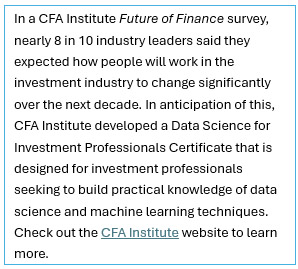On September 17, 2024, at the 28th Annual Global Investment Performance Standards (GIPS®) Conference in San Diego, one of the standout sessions was on the Use of AI in Investing and Performance. As artificial intelligence (AI) becomes a cornerstone of innovation across industries, the investment management sector is no exception. The session explored how AI and generative AI tools are reshaping roles within investment management firms, with leaders now needing a solid grasp of deep learning models to assess the ROI of AI deployments.
During the session, Max Gokham, Head of MosaiQ Investment Strategy at Franklin Templeton Investment Solutions, highlighted the transformative impact of AI on investment performance, emphasizing its growing role in portfolio management, performance measurement, operations, and compliance. The panel also discussed how humans and algorithms can effectively coexist, AI's potential to reshape financial markets, and practical considerations for firms integrating AI—all while firms continue to navigate compliance challenges like the SEC’s Marketing Rule.
Key takeaways from the session:
- AI is particularly effective at handling repetitive tasks, such as gathering and organizing data, integrating different datasets, and detecting patterns. While there are concerns about AI replacing jobs, panelists suggested that the technology is more likely to enhance roles by automating routine tasks rather than eliminating them. For example, AI could be used to compile performance reports and flag exceptions, allowing professionals to focus on higher-level strategic decisions. Mr. Gokhan predicts that over the next 5-10 years, AI will evolve significantly—from functioning in an "analyst" capacity to taking on responsibilities more similar to a "VP" role, managing increasingly complex tasks. As this shift occurs, humans may transition to overseeing AI agents or bots, ensuring the quality of their outputs while scaling overall productivity.
- As AI becomes more integrated into investment performance workflows, certain skills will become essential. Data science, in particular, is crucial; Mr. Gokhan mentioned that when hiring for roles that don’t necessarily require experience but do require a willingness to learn, he specifically looks for candidates with a data science background. While AI will undoubtedly transform the investment performance landscape, the general consensus is that it will shift jobs rather than eliminate them. Entry-level roles, such as data gatherers and analysts, are most at risk. However, instead of fearing replacement, professionals should ask themselves: "How can I collaborate with AI?" Those who learn to work alongside AI will lead the way in driving innovation. While some positions may disappear, new opportunities will arise for those equipped with the skills to partner with AI.
 One of the most crucial discussions around AI in investment management revolves around data security. As AI processes vast amounts of client data, there are concerns about potential breaches. However, algorithms exist to anonymize data, making it untraceable. Still, cybersecurity remains a critical area to watch as AI continues to evolve.
One of the most crucial discussions around AI in investment management revolves around data security. As AI processes vast amounts of client data, there are concerns about potential breaches. However, algorithms exist to anonymize data, making it untraceable. Still, cybersecurity remains a critical area to watch as AI continues to evolve.
At the start and end of the session, Mr. Gokhan polled the audience on how much they expected AI to impact their work over the next 24 months. Initially, when asked whether they believed AI would significantly influence their work during this period, the audience displayed a relatively low level of confidence in its transformative potential. However, after the session, which explored AI’s practical applications and future possibilities, the same question was posed again. This time, there was a notable shift in opinion, with significantly more attendees believing that AI will indeed reshape the way we work in the next near future.
Click here for the full conference recap.


